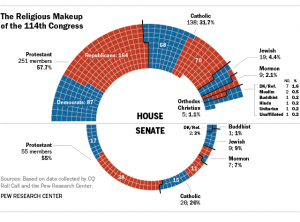by Greg Paul
This month Pew released their survey of the religious composition of Congress. What was not surprising is that much of it was the same old, same old. The religious, Christians especially, appear to be over represented, while nontheists look like they are seriously under served by their representatives ÔÇô if we take the Pew
numbers at face value.
According to the survey, about nine in ten Representatives and Senators are Christian. That is far higher than the three quarters of the general population often observed in surveys. Meanwhile, only one congressperson out of the nearly five hundred admits not being affiliated with religion. Just how many Americans are nonreligious depends on what one means by the term, and how the survey is
conducted. The value ranges from one in five to one half the population.
Two things are probably going on here. One is that nonbelievers are being discriminated against. It is well documented that Americans are reluctant to vote for open atheists and the like. The other factor is that it is actually unlikely that there are not a number of
nontheists in such a large institution, the nonbelievers are probably hiding themselves to avoid the political and personal pitfalls of being an open atheist. It is likely that seculars are not as under represented as it seems, but it is not possible to better assess the situation with the data on hand.
It is not secret that Republicans ÔÇô all but one of whom are avowed Christians — are more religious than Democrats.
The other notable item of the survey is that it found that, despite the Republican 2014 victory, the changes barely budged the religious nature of Congress.
